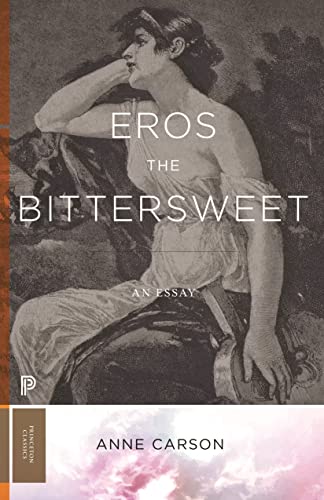
Eros the Bittersweet: An Essay (Princeton Classics)

The English word ‘symbol’ is the Greek word symbolon which means, in the ancient world, one half of a knucklebone carried as a token of identity to someone who has the other half. Together the two halves compose one meaning. A metaphor is a species of symbol. So is a lover. In the words of Aristophanes (in Plato’s Symposium):
Anne Carson • Eros the Bittersweet: An Essay (Princeton Classics)
Arrest occurs at a point of inconcinnity between the actual and the possible, a blind point where the reality of what we are disappears into the possibility of what we could be if we were other than we are.
Anne Carson • Eros the Bittersweet: An Essay (Princeton Classics)
difference. Such warfare marks the landscape of all human thought,
Anne Carson • Eros the Bittersweet: An Essay (Princeton Classics)
Paul Ricoeur calls this condition of mental tension a state of war wherein the mind has not yet reached conceptual peace but is caught between distance and proximity, between sameness and
Anne Carson • Eros the Bittersweet: An Essay (Princeton Classics)
a “split reference” (in Jakobsen’s terms), that is, an ability to hold in equipoise two perspectives at once.
Anne Carson • Eros the Bittersweet: An Essay (Princeton Classics)
shift of distance, which Aristotle calls an epiphora (Poet. 21.1457b7), bringing two heterogeneous things close to reveal their kinship.
Anne Carson • Eros the Bittersweet: An Essay (Princeton Classics)
“To give names to nameless things by transference [metaphora] from things kindred or similar in appearance” is how Aristotle describes the function of metaphor
Anne Carson • Eros the Bittersweet: An Essay (Princeton Classics)
a point which is also a verb—moreover a verb that triangulates, haunts, splits, wrenches and delights us each time it acts.